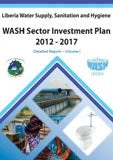
I began working in Liberia in late 2010 to help transition from a WASH sector dominated by donor-administered emergency projects, to one led by national institutions in a systematic manner. Only when a country’s own institutions have the capacity and resources to carry out long-term planning and successful interventions are sustainable improvements in services to be expected. In Liberia, these improvements are direly needed given that 40% of the rural population still lacks access to safe water, and less than 20% has access to improved sanitation.
The first point of our engagement was to improve the data on rural water infrastructure available to the national sector institutions. We worked with the Ministry of Public Works to create the first comprehensive database of protected public water points in post-war Liberia. This was achieved by deploying innovative new mobile-to-web mapping technology (FLOW) that allowed 150 local staff to rapidly map the entire country – from the capital city of Monrovia to remote rural villages. Thus, the Water and Sanitation Program (WSP) helped the ministry obtain a clear overview of needs for new infrastructure and repairs, and this data has become a key input into the sector investment plan.
The SIP provides an overall strategy for the water, sanitation and hygiene sector – but more than that, it gives clear estimates of the funds required to achieve national objectives, highlights priority areas and prices even concrete projects the government and its partners should pursue in the core-period of 2012 to 2017. It thus provides a concrete plan on how to meet the commitments H.E. the President of Liberia Ellen Johnson Sirleaf has made with her recent signature of the WASH compact.
Of course Liberia’s success will hinge on the availability of funds. The SIP estimates that US$ 400 million is needed to achieve the WASH targets for 2017, but much of this sum is yet to be mobilized. With a new plan and a reinvigorated sector, the time to step up has come. The launch of the SIP could provide the impetus for real action to bring relief to the millions of Liberians still denied some of the most basic human needs: safe water, clean sanitation, and proper hygiene.


Join the Conversation